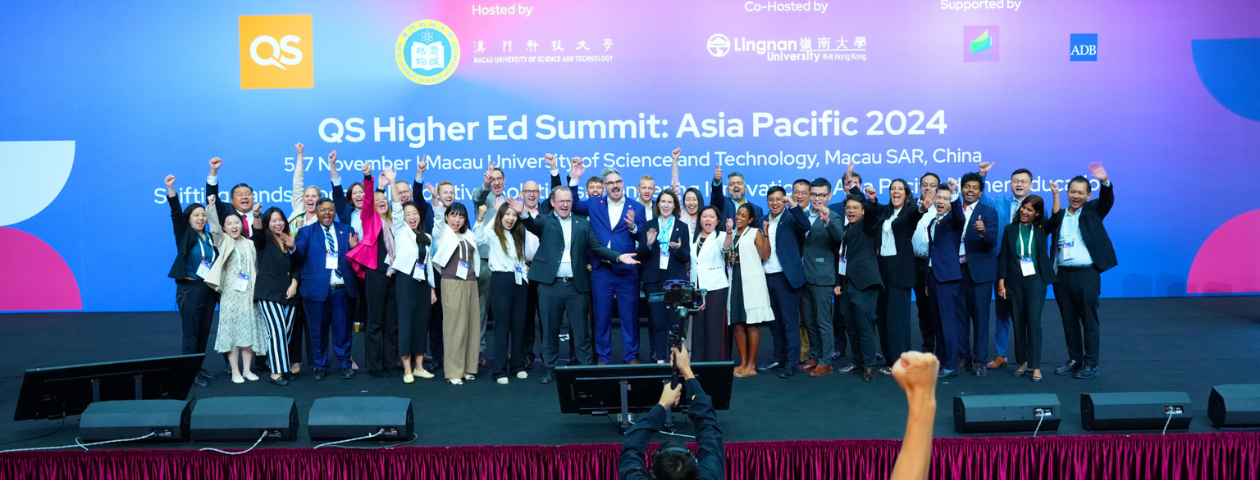
Read our reflections on three days of inspirational keynotes, panels and conversations at the QS Higher Ed Summit: Asia Pacific 2024 in Macau.
Higher education, government and industry experts came together to celebrate 20 years of the QS Higher Ed Summit: Asia Pacific. The sessions focused on shifting landscapes in the global higher education sector, and opportunities for forging collaborative solutions.
As QS CEO Jessica Turner observed: “Many things have changed since the first edition of our Asia Pacific Summit in 2005. However, the quality of the conversation and our collective determination to further excellence in the areas of greatest importance to institutions remains the same.”
Multiple agents of change have caused seismic shifts in higher education and society as a whole: From population growth to urbanisation, climate change and innovation in technology.
In a ceremonial speech to delegates, former Secretary-General of the United Nations, Ban Ki-Moon called for action and outlined the role of education in achieving every one of the Sustainable Development Goals.
“Now is a critical time to advance quality education to achieve sustainable development, expand climate action, build peace and empower human rights,” he said. “In this regard, I firmly believe this is our moment to accelerate action and illuminate a dynamic future for all people and the planet.”
A question at the heart of the three-day programme was: Where are key shifts taking place and how can universities in Asia Pacific and beyond navigate a new era of higher education excellence?
Heightened borderless competition
Driven by digital transformation, global mobility, and shifting education policies, credible alternatives to post-secondary education will create shifts in university programme design to provide broader access to higher education and in turn, drive increased competition across the globe.
Universities will be required to be strategic in diversifying their source markets to consider new and emerging countries. In the Asia Pacific region, focus is moving towards Indonesia, South Korea and the Philippines as notable study destinations.
QS CEO Jessica Turner said in the Summit’s opening remarks: “Some parts of the world, including Asia Pacific, have made real headwinds in international education. Some markets are becoming more restrictive, geopolitical forces are taking place and having an impact on student flows, but universities are always resilient and not only able to adapt but to find real solutions to challenges.”
Government engagement in globalisation success
As nations face a range of challenges – both individually and collectively – the role of governments in supporting higher education to thrive in the global market will be crucial. The higher education sector is a key driver for economic development and a robust higher sector can significantly contribute to an agile workforce equipped with the skills needed to navigate today’s complex world.
Speaking on a panel titled ‘Driving global impact through partnerships’, Dr Shirley Agrupis, Commissioner for the Commission of Higher Education in the Philippines said: “Governments plays a crucial role in producing globally competitive human capital. In the Philippines the current government gives premium to quality education and provides four critical pillars for universities to implement towards the government’s globalisation agenda.”
Dr Wooseung Kim, Vice Chairman of the Global University Committee at the Ministry of Education Korea, added: “Governments must move beyond management to play the role of service provider and supporter to the sector, enabling cooperation between nations.”
Collaboration in closing the global skills gap
By 2030, 14% of the global workforce is at risk of occupational displacement if nothing changes (McKinsey & Company). That is 376 million workers worldwide, relatively evenly distributed across the Global North and Global South.
According to QS Vice President of Strategy and Analytics, Matteo Quacquarelli, “we are at a critical inflection point in the future of work with a new wave of industrial change upon us. Digital, AI and green skills are the key areas of industry disruption in the coming years and the rate of skills change is where the challenge really lies.”
Speaking at the Summit about future skills, Quacquarelli spoke about the need for a skills framework that would enable economies and higher education systems to assess their preparedness to yield value and impact through the coming change. He said: “We need to set a skills-led transformation agenda at country and institutional level that closes the critical skills gaps that will enable us to drive economic growth for years to come.”
Thinking about AI beyond LLMs
The debut of Generative AI has ushered in a new era of transformation for higher education, though focus has been given to language learning models and regulating the use of LLMs across academic study. However, as QS Executive Director Patrick Brothers explored in an executive roundtable on ‘Reimagining higher education in the age of AI’, multi-modal and agent-driven AI experiences are changing the way we teach, learn, and research.
Brothers said: “Conversations about artificial intelligence in higher education are too general and institutions should instead think about how to break conversations into five areas of focus for AI planning, integration and rapid institutional outcomes: New credentials, the education work nexus, borderless competition, omni-channel learning and consumer grade tech experiences.”
Lifelong learning and flexible education
The rapid pace of technological change and economic shifts in the region are demanding a new breed of learner: the reskillers. However, QS Employability data shows that 82% of students doubt their abilities to achieve their career goals. How can higher education evolve to support individuals in building lifelong learning ecosystems that empower them to navigate the future?
On a panel titled ‘Rise of the reskillers: Building lifelong learning ecosystems’, Professor Dr Indang Ariati Ariffin, Vice President for Research & International Affairs at Management and Science University, said: “Change is a difficult thing to navigate, and people can often have a static mindset where they feel like their skills and knowledge cannot change. They need support in shifting that mindset to see what is possible, so it is important that universities instill a growth mindset in students today. Every day there are new skills to learn and opportunities to continuously overcome new obstacles.”
Higher ed and the Sustainable Development Goals
As we meet the halfway point for achieving the 2030 Agenda for the UN’s Sustainable Development Goals, only 15% of the 17 SDGs are on track to be achieved by the deadline. In her closing keynote speech on ‘Empowering futures: Higher education as a catalyst for sustainable development’, Un Wa Lok, President of Macau Language Exchange & Culture Promotion Association and UNESCO Member for the SDG 4 Youth & Student Network, addressed the global challenge.
Lok said: “We stand at a critical junction in our collective journey towards achieving the UN SDGs. Without quality education, the aspirations for a sustainable future remain unattainable. Higher education plays an indispensable role in fostering a sustainable future. As we navigate this rapidly evolving landscape the responsibility of educational institutions extends beyond conventional teaching. We must prepare our students to become innovators, problem solvers and leaders capable of addressing the complexities of our time.”



